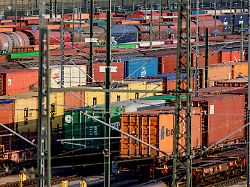A little less globalization?
Short supply chains save time and ensure supplies
By Andrea Sellmann and Mary Abdelaziz-Ditzow
September 21, 2023, 9:00 a.m
Functioning supply chains are the basis for our economy to run smoothly. Even the smallest disruptions have massive effects. And the road to China is long. Our neighbors also have a lot to offer. Have we exhausted that yet?
Supply chains span our globe like a network: ships and cargo planes, trains and trucks ensure that first the raw materials and then the goods find their way from A to B. Global trade has brought us prosperity, but it is vulnerable to disruption. The corona pandemic has made this more than clear to us. The Russian war of aggression against Ukraine has also shown us that we no longer want to trade with every country.
Even if we are no longer dependent on Russia for gas, our dependence is high in many other areas. For example with medication. Few manufacturers serve the global market from India and China, explains Matthias Weber, CFO of the generic drug manufacturer Hexal, in the “Wirtschaft Welt & Weit” podcast. Labor costs are lowest there. “If we want to continue to have cheap medicines and thus contribute to an affordable health budget, we have to make sure that we buy where it is cheapest,” said Weber.
And yet we continue to run into shortages of medicines. So do we need a little less globalization? Should we ship fewer goods halfway around the world and produce more in Germany? Or work even more closely with our European neighbors? This shortens supply chains and makes them more resilient, but requires investments. Who bears the costs? And what is friendshoring, i.e. trading with countries that share our values, worth to us? Host Mary Abdelaziz-Ditzow talks about this and more in the new podcast episode with guests who know the supply chain network very well from their everyday work.
In addition to Hexal CFO Matthias Weber, Angela Titzrath, CEO of Hamburger Hafen und Logistik AG, is also there, who knows how to assess the Chinese shipping company Cosco’s entry into a port terminal. Other guests include Angelika Huber-Straßer, regional director for the south at the auditing firm KPMG, and Marion Höllinger, spokeswoman for the board of HypoVereinsbank. The discussion was recorded at the Ludwig Erhard Summit.
What does Germany have to do to continue to play an important role in the economic world of tomorrow? Who do we depend on? Which countries benefit from the new world situation? Mary Abdelaziz-Ditzow discusses this with relevant experts in the ntv podcast “Wirtschaft Welt & Weit”.
You can find all episodes in the ntv app or wherever podcasts are available: at RTL+ music, Apple Podcasts, Google Podcasts, Spotify, Amazon Music or Deezer. For all other podcast apps you can use the RSS feed.
